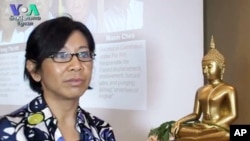When the UN-backed Khmer Rouge tribunal stood up in 2006, it offered a chance for many Cambodians to seek some form of truth and justice that many hoped could help heal some of the trauma wrought by the regime.
In the US, much of that help has come from Nou Leakhena, a Cambodian-American sociologist and professor who spends much of her free time helping other Cambodians in the US take advantage of what healing the tribunal might offer.
At a recent gathering in Long Beach called “From Victims to Witnesses,” Nou Leakhena sought to explain to victims how they might file grievances with the tribunal, which is preparing a trial for four jailed leaders of the Khmer Rouge.
One participant, Khun Oun, gave the kind of testimony at the event that Nou Leakhena has become used to as she’s traveled the US and brought many Cambodians together for participation in the trial. Khun Oun wept.
“I don’t want compensation, because my relatives aren’t coming back,” she said as she cried. “But I want the international tribunal to find justice for me.”
The tribunal, which has so far only tried one man, Khmer Rogue torture chief Duch, is facing a growing chorus of criticism that it is failing to include victims in the kind of participation envisioned at the court’s inception, at a risk to its mandate and legitimacy.
For Nou Leakhena, however, the court is just one way to heal what she says is widespread post-traumatic stress from the regime. So she also focuses on art and dance as ways to express the trauma, in an effort to heal it.
At the same time she was gathering potential witnesses and complainants for the tribunal recently, she put on a classes in “Art as Witness,” in nearby Santa Ana. Here, former victims of the Khmer Rouge were asked to draw their experiences, or their memories.
One man, Peter Ouch, drew three men tied together. “In Pol Pot’s regime,” he said, “I am in the middle. The Khmer Rouge arrested us when we were members of a working mobile unit. When an uprising took place, I fled my birthplace. They arrested me and tied me up.”
A man sitting nearby was skeptical. “Is it true?” he asked.
Ouch looked at the man and said, “Yes, it is. I was in Mongkul Borei district, Battambang province. This is me.” Then he pointed to his drawing. “The two men were in the mobile unit with me. The three of us were tied together and were beaten up for a night and a day. This man died.”
Nou Leakhena, who had been watching the exchange, gasped.
Nou Leakhena has chosen to help heal the trauma of the Khmer Rouge without having gone through the regime herself. Unlike many people involved in the tribunal or other activities surrounding it, she has no memory of the regime, no trauma of her own.
But she says she feels duty-bound to help the victims of the regime. She’s created the Applied Social Research Institute of Cambodia, in an effort to find out what helps heal such wounds, and what doesn’t.
“The main goal is to help them relieve their trauma,” she said in an interview at her office in Long Beach.
The institute has helped 170 people file complaints to the Khmer Rouge tribunal, as it prepares to try Nuon Chea, Khieu Samphan, Ieng Sary and Ieng Thirith for atrocity crimes, including genocide. Forty-three people were accepted as applicants for that trial, referred to at the court as Case 002.
Chhe Chheung, who lodged a complaint in that case, said of Nou Leakhena: “I respect her, because she likes helping Cambodians, solving Cambodian issues.”
Her students, too, respect her work.
“I think sociology and law are relevant because you need to understand how society works and what laws need to be followed and what should be followed and why,” said one student, Deepak Naik. “The more that I can learn from Professor Nou about what she is doing with the Khmer Rouge tribunal, the more that I think I benefit, and the more I would want and need to follow her footsteps.”
Participants in the institute’s activities say it helps them. And Nou Leakhena’s work has inspired a documentary. Michael Siv, who is shooting the film, said he wanted to highlight the “outstanding” work she has been doing.”
“Not everybody could achieve this kind of goal,” he said. “A lot of people can’t get [victims] to speak. But the victims need to find justice so they can move on.”




